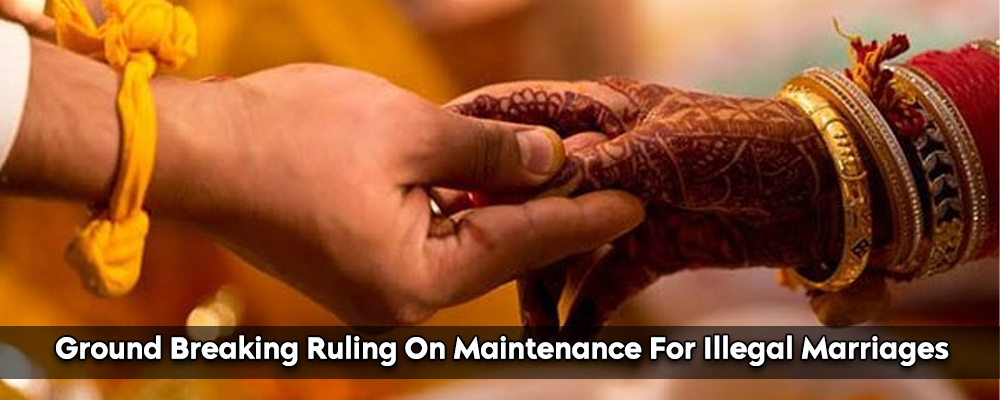Marriage is a sacred institution that bestows legal rights and responsibilities upon spouses. In a significant ruling, the Indian legal system has acknowledged the entitlement of a “wife” to maintenance under Section 125 of the Code of Criminal Procedure (CrPC), even if the marriage itself was not legally recognized.
This progressive interpretation by the courts ensures that women in relationships resembling marriage receive financial support, irrespective of the marriage’s legality.
Need A Legal Advice
The internet is not a lawyer and neither are you. Talk to a real lawyer about your legal issue

Section 125: Code of Criminal Procedure
Section 125 CrPC was enacted with the intention of safeguarding the rights of individuals who are unable to support themselves adequately. It specifically addresses the issue of maintenance and provides a legal recourse for dependents, including wives. Traditionally, maintenance claims were limited to legally valid marriages.
However, recent judicial pronouncements have expanded the scope of this provision to include women in relationships resembling marriage.
Role of Judiciary: Madras High Court
- In the case of Loyola Selva Kumar v Sharon Nisha, the Madras High Court’s ground-breaking ruling recognized the maintenance rights of a woman, even if her marriage was considered invalid under the law. The court upheld the principle that the intention behind Section 125 CrPC is to protect women in relationships that possess the essential characteristics of marriage, irrespective of its legal status.
- This decision marked a significant departure from the prevailing notion that maintenance claims were only applicable to valid marriages.
Social Impact and Gender Equality
The progressive interpretation of Section 125 CrPC has significant implications for gender equality and women’s empowerment. By granting maintenance rights to women in marriage-like relationships, regardless of legality, the court recognizes the vulnerabilities of dependent spouses and their need for financial security.
It sends a strong message that the law is dedicated to protecting women’s rights and dignity, irrespective of legal technicalities. This decision offers hope to women who might otherwise be unsupported due to legal complexities.
Steps to get Maintenance for Illegal Marriages
To seek maintenance for an illegal marriage, the steps are as follows-
Consult with a lawyer
Seek legal advice from a qualified lawyer who specializes in family law. They can guide you through the process and help assess the merits of your case.
Gather evidence
Collect evidence to support your claim for maintenance. This may include documents such as photographs, witnesses, financial records, or any other relevant evidence that can establish the existence of a marital-like relationship.
File a petition
Prepare and file a petition for maintenance under the relevant law in your jurisdiction. In India, this would typically be done under Section 125 of the Code of Criminal Procedure (CrPC).
State the facts
Clearly state the facts of your case in the petition. Describe the relationship, duration of cohabitation, financial dependency, and any other relevant details that demonstrate the nature of your relationship and the need for maintenance.
Attend court hearings
Attend the court hearings as scheduled. Present your case and provide supporting evidence to establish your entitlement to maintenance, despite the marriage being deemed illegal.
Provide financial details
Be prepared to provide financial information, including your income, expenses, and any other relevant financial details. This will assist the court in determining the appropriate amount of maintenance.
Court’s assessment
The court will assess the evidence presented, consider the provisions of the applicable law, and make a decision regarding the maintenance claim. The court’s decision will be based on factors such as the financial capacity of the other party and the needs of the dependent spouse.
Compliance and enforcement
If the court grants maintenance, ensure that the other party complies with the court’s order. If there is non-compliance, consult your attorney to explore legal remedies for enforcement, such as filing an execution petition.
Conclusion
The Madras High Court’s recognition of maintenance rights under Section 125 CrPC, even for marriages not legally valid, marks a significant step towards ensuring gender equality and financial security for women. This progressive interpretation of the law highlights the judiciary’s commitment to justice and reinforces the principle that every woman deserves protection and support, irrespective of the technicalities surrounding her marital status.
One can talk to a lawyer at Lead India for any kind of legal advice. In India, free legal advice online is available by Lead India. Along with getting free legal advice online, you can ask questions to experts online free at Lead India.





 Talk to a Lawyer
Talk to a Lawyer